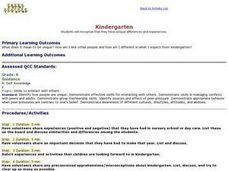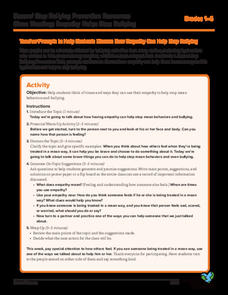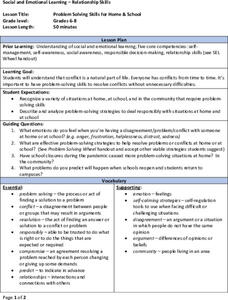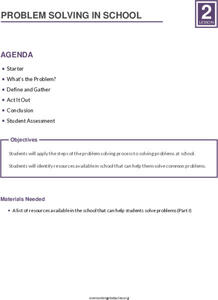Missouri Department of Elementary
Relationships…Quality Control
Quality relationships don't just happen. They require nurturing, patience, thoughtful communication, and honesty. Help tweens develop these relationship skills with an activity that asks them to themselves and then outline a...
Curated OER
Conflict Resolution
Conflict resolution is an important part of a positive school experience. Here, learners practice strategies to resolve problems. They learn how to use I statements, engage in role plays, and practice giving affirmation.
Missouri Department of Elementary
Color Your Community
Eighth graders work together to come up with a topic for a service learning project that engages all members of the school community. Groups then develop a dialogue and visit other classrooms to encourage other students to participate....
Missouri Department of Elementary
Origins: A Simple Word Game For Use In Human Relations Trainings
Words can hurt. Words may not break bones but they can break a heart. An activity focused on the meaning of and the history of some often heard words and phrases is designed to raise awareness of the importance of choosing words...
Curated OER
Kindergarten
Students engage in a discussion about their preconceived ideas about kindergarten. They share their feelings about being in kindergarten and listen to the book "Oh, The Places You'll Go!" by Dr. Seuss.
Committee for Children
Class Meeting: Empathy Helps Stop Bullying
A lesson instills the importance of how empathy has the ability to aid in stopping bullying behavior. Scholars discuss, in-depth, a series of three questions. Using class input, an anchor chart is made then displayed for reference.
Department of Education (Ireland)
Understanding Influences
"Understanding Influences," a richly detailed, carefully scaffolded unit, asks middle and high school scholars to examine how internal and external factors like friends, media, and society influence their attitudes and...
Education Foundation of Sarasota County
Problem Solving Skills for Home and School
Dr. Seuss' The Zax has a lesson to teach tweens and teens about the importance of problem-solving skills. After viewing the short video, groups identify conflicts that may occur at home, in school or in the community. They then...
Overcoming Obstacles
Integrity
A lesson showcases the character trait of integrity. Scholars define the term, discuss how having integrity means being trustworthy, that one can choose to have integrity, and the significance of looking at situations from other...
Overcoming Obstacles
Starting the Decision Making Process
The takeaway from a lesson on decision-making is that the more significant the consequences, the more complex the decision. Class members brainstorm a list of factors they consider when making decisions and then create a flow chart of...
Overcoming Obstacles
Problem Solving in School
Scholars learn how to be part of the solution to problems high schoolers face. After identifying problems at their school, participants list cues that indicate each problem, note campus resources available to help solve the problem, and...
Overcoming Obstacles
Problem Solving on the Job
The truth is there are consequences for actions. The third lesson in the "Problem Solving Module" asks class members to brainstorm a list of problems, select one and invent a system, process, or object that might solve the problem. They...
Overcoming Obstacles
Problem Solving at Home
The final lesson plan in the "Problem Solving Module" focuses on finding creative solutions to problems that might arise at home. Individuals then create a storyboard that illustrates how they would apply the six-step problem-solving...
Overcoming Obstacles
Problem Solving Techniques
Participants in the first lesson of the "Problem Solving Module" discover that the techniques used to solve problems follow the same steps they practiced in the "Decision Making Skills Module." Groups focus on different characters in a...
Overcoming Obstacles
Making and Evaluating Decisions
It's time to decide. Class members review the decision-making process (define the issue, gather information, develop alternative, and analyze the consequences). Groups then decide which of the six characters they have chosen for the...
Overcoming Obstacles
Exploring Alternatives and Considering Consequences
Before making important decisions, it's imperative to consider alternatives and the possible consequences of choices. The third lesson in the fallout shelter activity begins by asking participants to consider the possible positive and...
Overcoming Obstacles
Gathering Information
What facts are essential, and what facts are irrelevant when making a decision? As class members continue with the Fallout Shelter exercise, groups develop questions and interview the 10 volunteers acting as candidates for the bomb...
Overcoming Obstacles
Integrity
A lesson plan about integrity challenges scholars to define it, discuss why it's essential, and the benefits of having it. Class members brainstorm ways to show integrity at home, at school, and in the community. Pupils...
Overcoming Obstacles
Handling Peer Pressure
Class members participate in a discussion to identify all types of positive and negative peer pressure and brainstorm strategies to not give in to negative peer pressure. Scholars create a T-chart to record their observations....
Overcoming Obstacles
Developing Personal Power
Money? Beauty? Education? The final lesson plan in the Confidence Building module encourages middle schoolers to consider the power they have to determine the course of their lives. After investigating different forms of power,...
Overcoming Obstacles
Weighing Options and Consequences
When making decisions, it might be wise to revise Newton's Third Law of Motion to read, "For every decision, there are options and consequences." Although in decision-making, not all these forces may be equal. The third lesson in the...
Overcoming Obstacles
Identifying Options
Making a decision can be more like a multiple-choice question than a yes/no one. Through a series of activities, middle schoolers learn how to consider and identify options, choices, and alternatives when faced with an important decision.
Overcoming Obstacles
Defining Problems Big and Small
Problems come in all shapes and sizes, but the first step in solving a problem is to identify just what the problem is. Through a series of games and activities, middle schoolers learn first to identify a problem, decide on a solution,...
Overcoming Obstacles
Identifying Options
"What should I do?" "How should I do it?" Middle Schoolers learn that answering these two questions is the key to solving problems. They begin with the first two steps of the Decision Making Process (gathering information and identifying...























